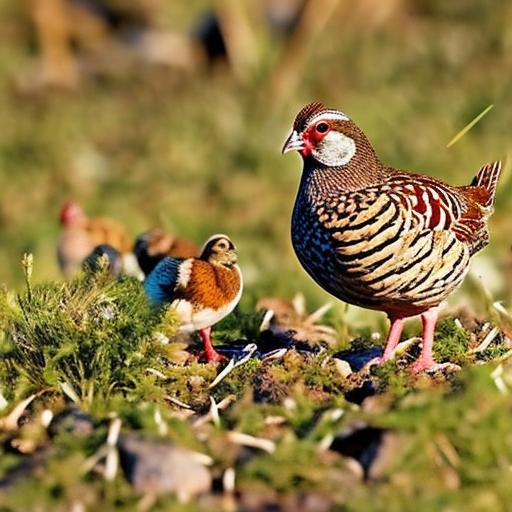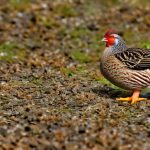Keeping quail with chickens is a popular practice among homesteaders and small-scale farmers. Quail and chickens can coexist harmoniously, providing a range of benefits including pest control, efficient use of space, and diversified egg production. Quail are small, ground-dwelling birds that are known for their high egg production and gentle nature. When kept alongside chickens, they can contribute to a more sustainable and diverse farm ecosystem. In this article, we will explore the benefits of keeping quail with chickens, housing and enclosure considerations, feeding and nutrition, health and disease management, and how to integrate quail into a chicken flock.
Quail and chickens have different needs and behaviors, but with proper planning and management, they can thrive together. By understanding the unique characteristics of both species, farmers can create a balanced and productive environment for their birds. Whether you are a seasoned poultry keeper or just starting out, the information in this article will help you make informed decisions about integrating quail into your chicken flock.
Key Takeaways
- Keeping quail with chickens can be a beneficial and rewarding experience for poultry enthusiasts.
- Benefits of keeping quail with chickens include pest control, diversified egg production, and reduced feed costs.
- When housing quail and chickens together, it’s important to consider space requirements, predator protection, and separate nesting areas.
- Feeding and nutrition for quail and chickens should be carefully balanced to meet the specific dietary needs of each species.
- Health and disease management for quail and chickens involves regular monitoring, vaccination, and biosecurity measures to prevent the spread of illness.
Benefits of Keeping Quail with Chickens
There are several benefits to keeping quail with chickens. One of the main advantages is pest control. Quail are natural foragers and will eagerly consume insects, grubs, and other pests that can be harmful to garden crops and chicken feed. By allowing quail to roam freely in the same area as chickens, farmers can reduce the need for chemical pest control methods and improve the overall health of their farm ecosystem.
Another benefit of keeping quail with chickens is efficient use of space. Quail require less space than chickens and can be housed in smaller enclosures, making them an ideal addition to a small-scale farm or backyard homestead. By utilizing the same space for both quail and chickens, farmers can maximize their land resources and increase overall productivity.
In addition to pest control and space efficiency, keeping quail with chickens can also diversify egg production. Quail eggs are smaller than chicken eggs but are prized for their delicate flavor and nutritional value. By keeping both quail and chickens, farmers can offer a wider variety of eggs to their customers or enjoy a diverse selection for their own consumption.
Housing and Enclosure Considerations for Quail and Chickens
When it comes to housing and enclosure considerations for quail and chickens, there are several important factors to keep in mind. Quail and chickens have different housing requirements due to their size, behavior, and environmental preferences. It is essential to provide separate living spaces for each species to ensure their well-being and productivity.
For quail, a secure and well-ventilated enclosure is essential. Quail are ground-dwelling birds that prefer to have access to open space for foraging. A quail enclosure should be constructed with a solid bottom to prevent digging predators from gaining access to the birds. Additionally, providing shelter such as low-lying bushes or small structures will give quail a sense of security and protection from the elements.
Chickens, on the other hand, require a larger coop with roosting bars, nesting boxes, and adequate ventilation. The coop should be spacious enough to accommodate the number of chickens in the flock and provide enough room for them to move around comfortably. It is important to consider the breed and size of the chickens when designing the coop to ensure that they have enough space to exhibit natural behaviors such as scratching, dust bathing, and perching.
When integrating quail into a chicken flock, it is crucial to provide separate housing for the two species. While they can coexist in the same general area, having separate enclosures will prevent competition for resources and reduce the risk of aggression between the birds.
Feeding and Nutrition for Quail and Chickens
Feeding and nutrition are critical aspects of keeping quail with chickens. Both species have specific dietary requirements that must be met to ensure their health and productivity. Quail are omnivorous birds that require a diet high in protein to support their rapid growth and egg production. A commercial game bird feed or a high-protein poultry feed is suitable for quail, supplemented with fresh greens, insects, and grit for digestion.
Chickens have similar dietary needs but may require a different feed formulation based on their age, breed, and purpose (e.g., egg-laying hens versus meat-producing broilers). A balanced chicken feed that provides essential nutrients such as protein, carbohydrates, vitamins, and minerals is essential for maintaining healthy chickens. Additionally, providing access to fresh water, grit for digestion, and occasional treats such as fruits and vegetables will contribute to overall well-being.
When feeding quail and chickens together, it is important to monitor their intake to ensure that each species is receiving adequate nutrition. Quail may require separate feeding stations to prevent competition with chickens for food. Additionally, providing multiple water sources will ensure that both quail and chickens have access to clean water at all times.
Health and Disease Management for Quail and Chickens
Maintaining the health of quail and chickens is essential for successful cohabitation. Both species are susceptible to a range of diseases and parasites that can impact their well-being and productivity. Implementing good biosecurity practices, regular health checks, and appropriate disease management strategies will help prevent the spread of illness within the flock.
Quail are particularly susceptible to respiratory diseases such as infectious bronchitis and coryza. It is important to keep quail in a clean environment with good ventilation to reduce the risk of respiratory infections. Additionally, monitoring for signs of illness such as sneezing, coughing, or nasal discharge will allow for early intervention if disease is suspected.
Chickens are prone to a variety of health issues including parasites (e.g., mites, lice), respiratory infections (e.g., infectious bronchitis), and reproductive disorders (e.g., egg binding). Regular health checks, proper sanitation practices, and access to veterinary care will help prevent and manage these issues.
When keeping quail with chickens, it is important to quarantine new birds before introducing them to the existing flock to prevent the spread of disease. Additionally, maintaining separate feeding and watering stations for quail and chickens will reduce the risk of cross-contamination.
Integrating Quail into a Chicken Flock

Integrating quail into a chicken flock requires careful planning and management to ensure a smooth transition for both species. When introducing quail to an existing chicken flock, it is important to provide separate living spaces initially to allow the birds to become familiar with each other’s presence without direct contact.
Gradually introducing quail and chickens in supervised settings will allow them to acclimate to each other’s presence without causing undue stress or aggression. Providing enrichment such as perches, hiding spots, and dust bathing areas will help reduce competition for resources and promote positive interactions between the birds.
It is important to monitor the behavior of both quail and chickens during the integration process to identify any signs of aggression or stress. If necessary, separating individual birds or groups may be required to prevent injury or conflict.
Once quail have been successfully integrated into a chicken flock, it is important to continue monitoring their interactions and well-being on an ongoing basis. Providing adequate space, resources, and environmental enrichment will contribute to a harmonious coexistence between quail and chickens.
Conclusion and Final Considerations for Keeping Quail with Chickens
Keeping quail with chickens offers a range of benefits including pest control, efficient use of space, and diversified egg production. By understanding the unique characteristics of both species and implementing appropriate management practices, farmers can create a balanced and productive environment for their birds.
When considering keeping quail with chickens, it is important to carefully plan for housing and enclosure considerations, feeding and nutrition requirements, health and disease management strategies, and integration processes. By taking these factors into account, farmers can successfully integrate quail into a chicken flock while promoting the well-being and productivity of both species.
Overall, keeping quail with chickens can be a rewarding endeavor that contributes to a more sustainable and diverse farm ecosystem. With proper planning, management, and care, farmers can enjoy the benefits of cohabitating these two species while creating a thriving poultry operation.
If you’re considering keeping quail with chickens, it’s important to ensure that your coop is suitable for both species. A large chicken coop can provide ample space for both chickens and quail to roam and forage comfortably. In fact, Poultry Wizard has a great article on large chicken coop ideas that can be easily adapted to accommodate quail as well. Check out their article here for some helpful tips on creating a spacious and functional coop for your mixed flock.
FAQs
What are the benefits of keeping quail with chickens?
Quail and chickens can coexist peacefully and provide benefits such as pest control, increased egg production, and a diverse range of eggs for consumption.
What should be considered before keeping quail with chickens?
Before keeping quail with chickens, it is important to consider the space requirements, potential for disease transmission, and the need for separate housing and feeding arrangements.
What are the space requirements for keeping quail with chickens?
Quail and chickens should have separate living spaces to prevent aggression and disease transmission. Each bird should have adequate space to move around and access food and water.
How can disease transmission be prevented when keeping quail with chickens?
Disease transmission can be prevented by keeping quail and chickens in separate living spaces, providing separate feeding and watering stations, and practicing good hygiene and biosecurity measures.
What should be considered when feeding quail and chickens together?
Quail and chickens have different dietary requirements, so it is important to provide separate feed for each species. Additionally, quail and chickens should have separate feeding stations to prevent competition and aggression.
Can quail and chickens share the same outdoor space?
Quail and chickens can share the same outdoor space as long as there is enough room for both species to move around comfortably and access food and water. It is important to monitor for any signs of aggression or stress and provide separate hiding spots for quail if needed.
Meet Walter, the feathered-friend fanatic of Florida! Nestled in the sunshine state, Walter struts through life with his feathered companions, clucking his way to happiness. With a coop that’s fancier than a five-star hotel, he’s the Don Juan of the chicken world. When he’s not teaching his hens to do the cha-cha, you’ll find him in a heated debate with his prized rooster, Sir Clucks-a-Lot. Walter’s poultry passion is no yolk; he’s the sunny-side-up guy you never knew you needed in your flock of friends!







